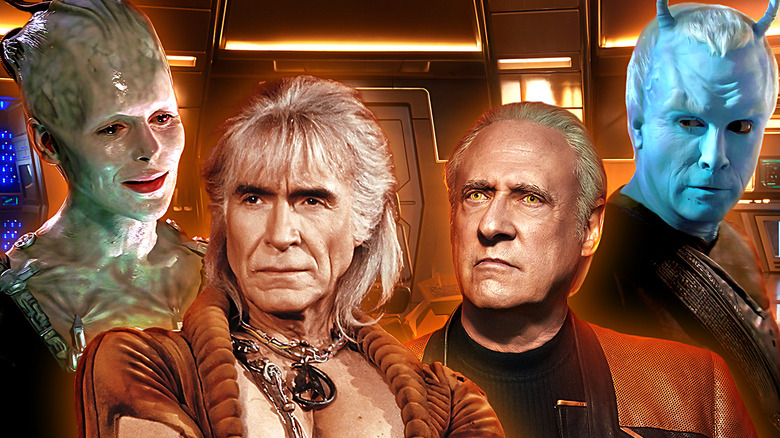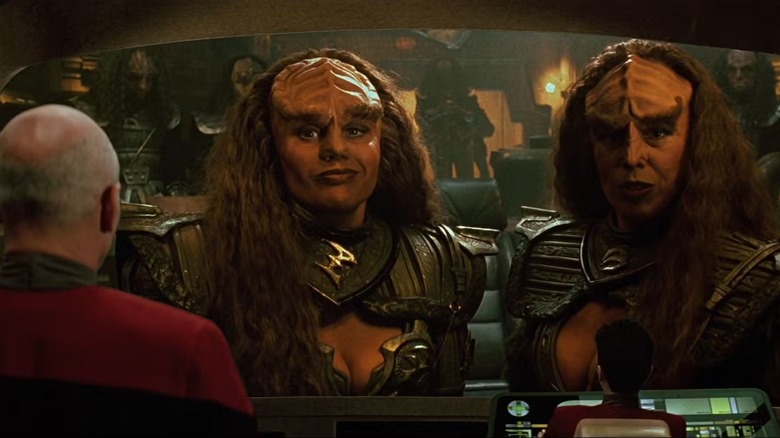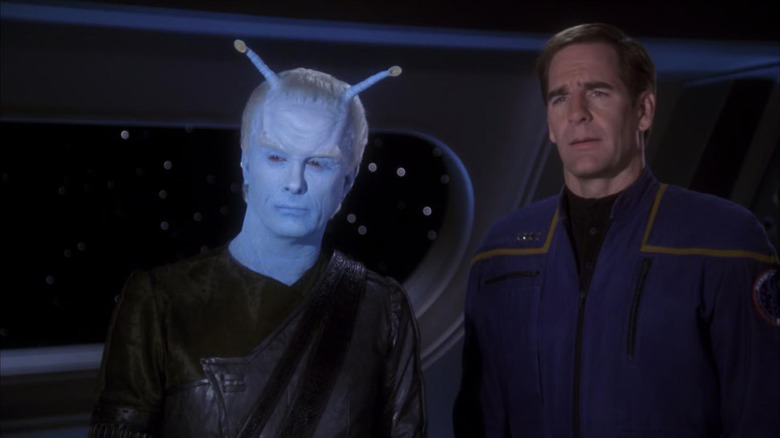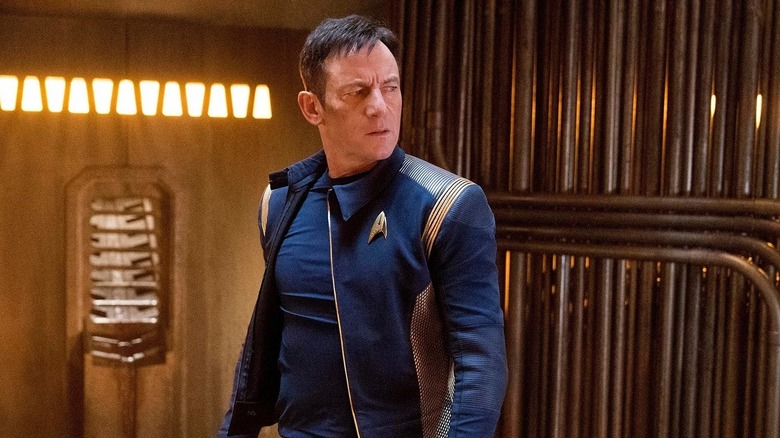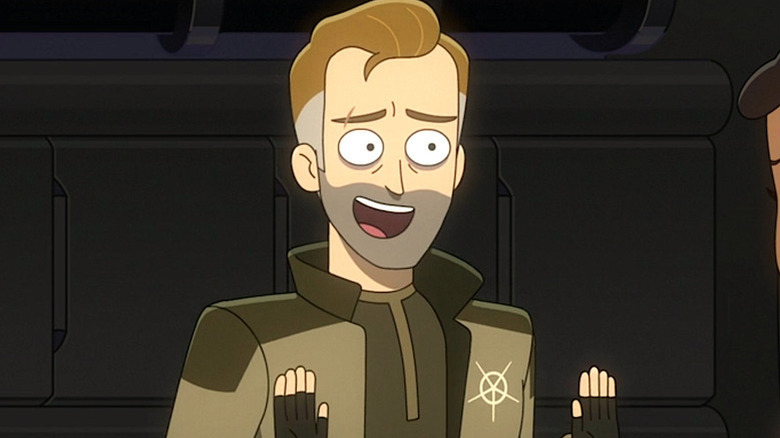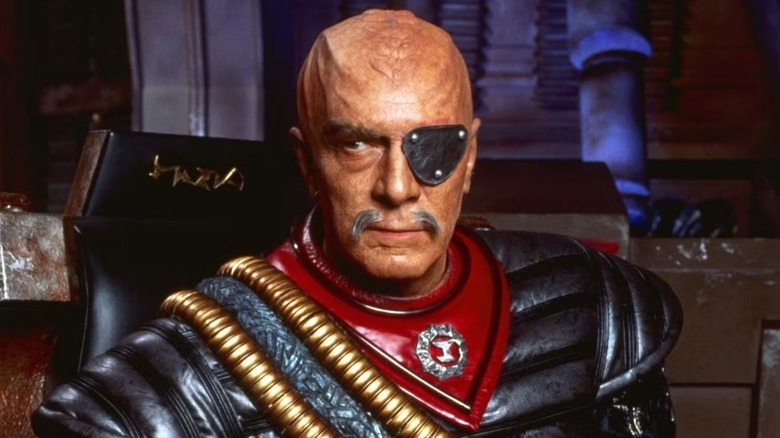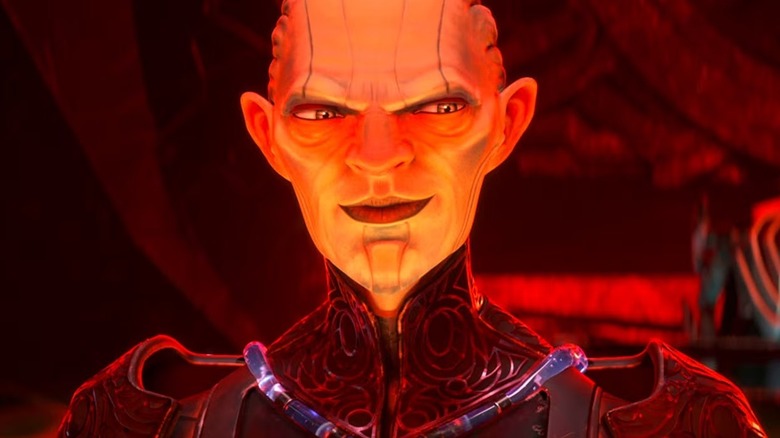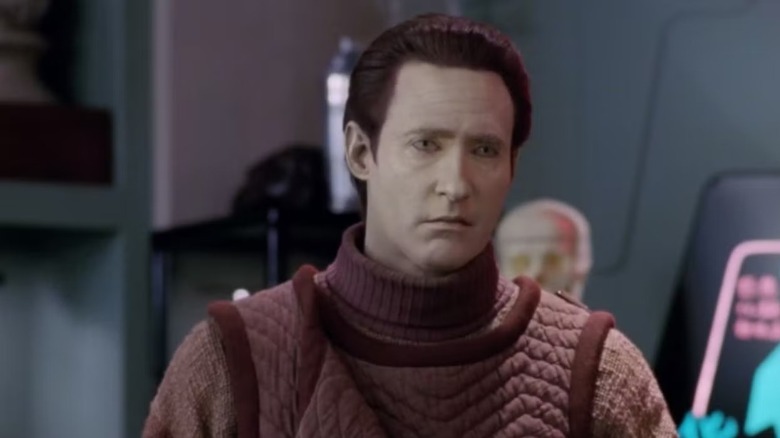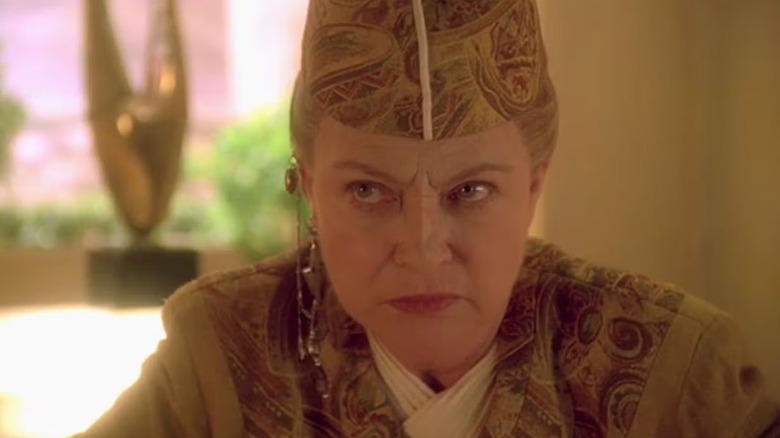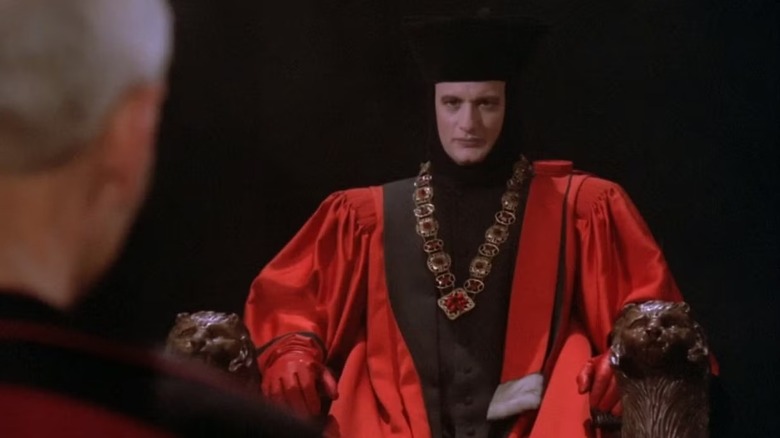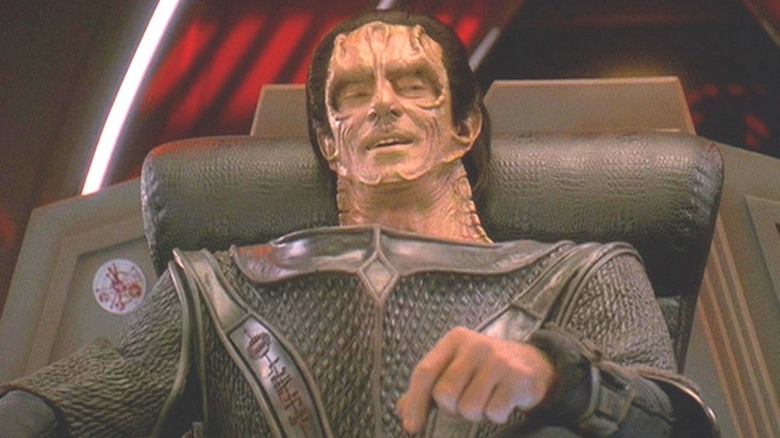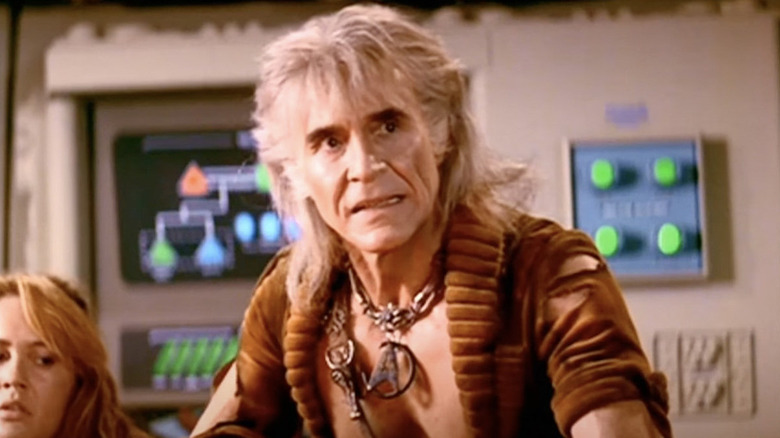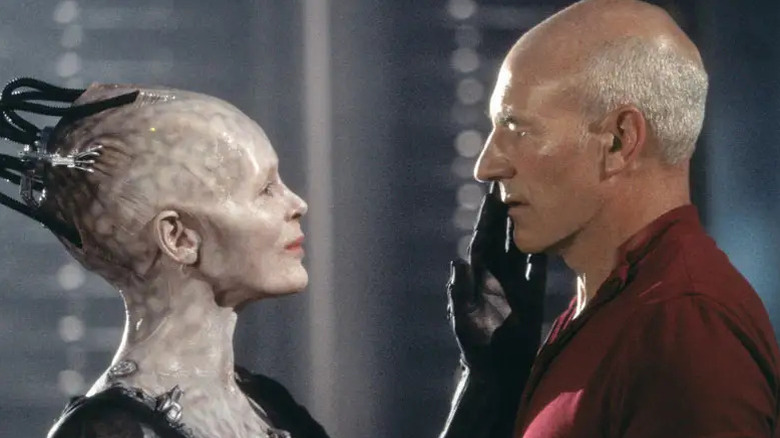The Best Star Trek Villains Of All Time, Ranked
While "Star Trek," across its growing number of shows and movies, depicts a hopeful vision of the future, it's not without its formidable enemies. From opposing interstellar empires to shadowy figures within Starfleet, there are plenty of nefarious villains littered throughout the franchise's history. The best kinds of enemies aren't just villain-of-the-week adversaries for the various "Star Trek" stories, but present menace to the main characters. And in a future full of hyper-competent heroes, it stands to reason that their antagonists must be equally cunning, with the more memorable ones causing a costly victory.
With over 60 years of television and film history, there is quite the catalog of "Star Trek" villains to choose from. With that in mind, there are only a handful that rise above the rest as the definitive antagonists that each gave Starfleet's bravest and boldest the fight of their lives. Here are the best "Star Trek" villains of all time, across the franchise's expansive history on television and film.
12. The Duras Sisters
Even by the events of "Star Trek: The Next Generation," not all Klingons are happy at the existing peace between their empire and the Federation. The House of Duras, through its sisters Lursa (Barbara March) and B'Etor (Gwynyth Walsh) sows widespread strife and instability in the Klingon Empire to gain prominence and power. After their bid to lead the empire is quelled by Jean-Luc Picard (Patrick Stewart), the Duras sisters hold a special grudge towards him and the Enterprise. This culminates with the sisters successfully destroying the Enterprise-D in "Star Trek: Generations," albeit at the cost of their own lives.
Few characters can make the claim that they've actually destroyed the starship Enterprise, but the siblings are among their number. They are a reminder that despite the presence of Worf (Michael Dorn), the Klingons are still a formidable and unpredictable force in the galaxy. Prior to their demise, the Duras sisters appear early in "Star Trek: Deep Space Nine," foreshadowing the renewed hostilities between the Federation and the Klingon Empire. Indeed, the Duras sisters personify the specter of a more adversarial Klingon presence, ready to fall back into old, violent habits and threaten the fragile, hard-won peace.
11. Thy'Lek Shran
Given the complex nature of interstellar politics and brinkmanship, not every antagonist in "Star Trek" is a clear-cut villain. A prominent example of this is Thy'Lek Shran (Jeffrey Combs), a Commander in the Andorian Imperial Guard, encountered by humanity in the first season of "Star Trek: Enterprise." Intensely distrustful of humanity's spacefaring alliance with the Vulcans, Shran leads a commando raid on a Vulcan outpost and opposes Captain Jonathan Archer (Scott Bakula) on multiple missions. It's only when the Andorians are faced with mutual enemies in the Xindi and a rogue Vulcan that Shran openly works alongside Archer towards humanity's defense.
Though many recurring "Star Trek" characters have their own redemptive arcs, none are quite as fully realized as Shran's. The surly Andorian goes from Archer's captor and torturer to reluctant ally and, eventually, trusted partner. Combs has had plenty of experience playing "Star Trek" characters before, including antagonists, but imbues Shran with an enormous amount of depth and complexity. With Shran, audiences got something that "Star Trek" villains rarely earn: true atonement. That makes his heroic turn over the course of the series feel all the sweeter.
10. Gabriel Lorca
The Captain of the USS Discovery at the start of "Star Trek: Discovery," Gabriel Lorca (Jason Isaacs) is a capable officer unafraid of bending rules to get the job done. After the Discovery is accidentally transported to the morally inverted Mirror Universe, Lorca reveals he is actually from this parallel dimension all along. Manipulating the Discovery crew to return to his home universe, Lorca tries to assassinate Emperor Phillipa Georgiou (Michelle Yeoh) in a bid to lead the Starfleet analog of this world. Unsuccessful, Lorca is outmaneuvered by Michael Burnham (Sonequa Martin-Green) and Georgiou, killed by the latter before the Discovery returns to its own universe.
Lorca's heel turn and his true origins provide "Star Trek" with one of its biggest plot twists across its long history and one that has yet to be topped since. Prior to the Mirror Universe detour, Lorca was rough around the edges and cunning tactician, but still a charming commanding officer to his crew. Learning all of that apparent camaraderie was all part of a long game being played by Lorca to deceive his crew makes his betrayal all the more painful. "Discovery" struggled to find a primary antagonist as effective as Lorca moving forward and given how well Isaacs played his two-faced role, it's hard to blame them.
9. Nick Locarno
Given the comedic premise to the animated series "Star Trek: Lower Decks," one might not expect genuine threats to the galaxy, but each season brings the dire stakes. The fourth season culminates in the return of Nick Locarno, who previously appeared in "The Next Generation" as a disgraced Starfleet cadet who nearly destroyed Wesley Crusher's career. Robert Duncan McNeill reprises his role as Locarno for "Lower Decks," with the character even more villainous than in his prior live-action appearance. The overarching antagonist of the fourth season, Locarno leads mutineers from disparate fleets, armed with the destructive Genesis Device in a bid for his armada to be formally recognized.
Just as Locarno provides Crusher a hard lesson in integrity in "TNG," he also has significant influence over the Beckett Mariner (Tawny Newsome). We learn that Locarno's manipulations caused a deep-seated guilt in Mariner that informed her personality in the first four seasons of "Lower Decks." Mariner brings a rebellious spirit and defiant energy to the show and its freewheeling sensibilities, borne from a ghost of Starfleet past back for revenge. And though Locarno's hubris nearly causes widespread devastation, in true "Lower Decks" fashion, the show can't help but poke fun at his uncanny resemblance to "Voyager" character Tom Paris. Also played by McNeill, Locarno's obvious physical similarities to Paris being pointed out reminds the audience with a wink that this is still a self-aware "Star Trek" comedy despite the stakes.
8. General Chang
With so many Klingon villains throughout "Star Trek," the truly memorable ones really have to be wildly unique to stand out. General Chang (Christopher Plummer) in "Star Trek VI: The Undiscovered Country" certainly qualifies as he faces James Kirk (William Shatner) in his final adventure as Captain of the Enterprise. With a striking design compared to his Klingon contemporaries, Chang habitually quotes William Shakespeare as he commands his Bird of Prey. Chang is part of a shadowy conspiracy plotting to trigger a war between the Federation and Klingon Empire.
Audiences have seen plenty of raspy voiced Klingons extolling the value of honor and their hatred of Starfleet for decades. With an erudite Klingon in Chang, "The Undiscovered Country" gets a much more distinct and entertaining villain to close out the classic "Star Trek" cast's run. In lesser hands, Chang would've descended into pure camp but, with Plummer powering the performance, the Klingon general is an understated, gentlemanly menace. And, of course, any villain that wears an eyepatch has their cool factor increased significantly.
7. The Diviner
The animated series "Star Trek: Prodigy" may be geared more towards younger audiences, but it has one of the best villains the franchise has seen in years. Initially set outside of the Alpha Quadrant where most "Star Trek" stories take place, this region outside Starfleet jurisdiction is tyrannically run by the Diviner (John Noble). Over the first season, the Diviner is revealed to be a time-traveler with a grudge against Starfleet, intent on using the USS Protostar as part of his revenge. The Diviner is also the genetic source of "Prodigy" main character Gwyn (Ella Purnell), effectively making her the heroic clone of her embittered father figure.
Any villain played by Noble is definitely going to stick with audiences, but the Diviner has an enormous amount of depth and nuance throughout "Prodigy." As the show reveals more about him, his tragic backstory is unveiled while a younger, more sympathetic version of the character, named Ilthuran, is introduced. With "Prodigy" dealing heavily with the concept of divergent timelines, its initial primary antagonist has the benefit of being depicted in a number of intriguing and radically different ways. This multifaceted approach makes the Diviner one of the most richly devised adversaries in "Star Trek," all grounded by Noble's eloquent performance.
6. Lore
One of several identical androids constructed by Noonien Soong (Brent Spiner), Lore (Spiner) is effectively Data's evil twin. Introduced in the first season of "The Next Generation," Lore is as devious as he is cunning, wiping out a colony in his debut appearance. In subsequent appearances, Lore murdered Soong, effectively committing patricide, and leads a detachment of rogue Borg later in "TNG." Lore resurfaces at the end of "Star Trek: Picard," merged with components of Data and their android sibling B-4, with Data eventually deleting Lore for good.
Spiner is clearly having a blast whenever he gets the opportunity to play Lore, playing a physical duplicate of his usual character Data, but someone who openly relishes being evil. An android with daddy issues and delusions of grandeur, Lore is offered numerous attempts at redemption that he consistently rebuffs. Even in their final confrontation, Data gives Lore one last chance for them to coexist, only for Lore's hubris to lead to his permanent deletion. Data is an android deeply curious about humanity and aspiring to join it, while Lore is an android who holds humanity in open contempt, eager for its downfall.
5. Kai Winn Adami
Winn Adami (Louise Fletcher) rises to the rank of Kai during the first season of "Deep Space Nine," a highly influential position within Bajoran society. A religious fundamentalist, Kai Winn clashes with DS9 personnel over her conservative politics and deep mistrust of the Federation. The Cardassian leader Gul Dukat (Marc Alaimo) takes advantage of Winn's religious extremism to help him work with the Pah-wraiths, ephemeral entities representing evil in Bajoran theology. It isn't until the series finale that Winn realizes that she's been deceived, giving Captain Sisko (Avery Brooks) the information he needs to defeat the Pah-Wraiths before she dies.
Whereas the Cardassians and their allies embody conventional external antagonists throughout "DS9," Kai Winn personifies the enemy festering within a society. Winn is the villainous bureaucrat, whose extremism chafes against the Federation's drive to build a utopian world of tolerance and peaceful coexistence. That Winn, after years of indoctrinating people with her fundamentalist messaging, cannot see the true spiritualist threat in front of her, makes her demise all the more ironic. Winn is so unnerving because we know people like her in real-life, in our personal lives and in the news, as a cynical reflection of our world.
4. Q
At first glance, it may seem odd to include Q (John de Lancie) here, given the character's absurdist tendencies, but he has repeatedly threatened to erase humanity from existence. Introduced at the start of "The Next Generation," Q is part of an omnipotent race capable of rewriting reality with a snap of their fingers. Q selects Picard as a representative for humanity to determine if they're worthy to continue to exist, given their history of barbarity. Q resurfaces in "Deep Space Nine," "Star Trek: Voyager," "Lower Decks," and "Star Trek: Picard" as his self-imposed trial of humanity continues.
Though initially a much more menacing character, Q quickly demonstrates a more mischievous, even playful, side to his personality in later appearances. This sets the character apart from more conventional "Star Trek" antagonists, with Q alternating between nuisance, ally, and genuine threat across his extensive history. The "TNG" finale reminds audiences of Q's more adversarial nature, as does his return in "Picard," making him a more serious figure once again. Q is one of the few villains in "Star Trek" that also considers himself a friend to his opponents, at the very least Picard, in his own twisted way. This perhaps makes him one of the most personal villains "Star Trek" has ever had.
3. Gul Dukat
Dukat is one of the few characters to appear in both the series premiere and series finale of "Deep Space Nine," effectively bookending the entire run. Introduced as the former commander of DS9 when it was a Cardassian Union space station, Dukat eventually ascends to lead the entire Cardassian Union during the Dominion War. Across the show's narrative, Dukat progresses from a diplomatic rival to an occasional reluctant ally, and finally a sworn enemy of the series' Federation and Bajoran characters. Though Dukat shows moments of sympathy throughout the story, he eventually becomes a hardened religious zealot and the clear mortal enemy to Sisko.
With more screen time than any other singular "Star Trek" villain, Dukat gets the rare opportunity to grow in a way no other antagonist had before or since. The character could've just been a mustache-twirling Cardassian that serves as a constant thorn in Sisko and the DS9 crew's side, but he's much more nuanced than that. His opponents, and by extension the audience, grow to understand and even respect Dukat over the course of the show, with the strong writing elevated by Alaimo's performance. By the time Dukat breaks bad for good by killing Jadzia Dax (Terry Farrell), it's just as heartbreaking to realize that there will be no redemption for the Cardassian villain.
2. Khan Noonien Singh
Khan Noonien Singh was always going to make a high ranking here, the only character to be the main antagonist in two "Star Trek" movies, albeit in different timelines. Introduced in an episode of "The Original Series," Khan (Ricardo Montalban) is a genetically enhanced supervillain exiled by Kirk and the Enterprise to a remote planet. Decades later, Khan escapes from his planetary prison, hunting Kirk after recovering an experimental device capable of destroying worlds. In the Kelvin Timeline, Khan creates weapons for a rogue Starfleet admiral before betraying him and confronting the Enterprise.
What makes Khan an especially personal enemy for Kirk and his crew isn't just his status as a rare repeat villain from the "TOS" era. He signifies the franchise growing up and darker in tone, no longer the more cavalier adventures the Enterprise enjoyed during "TOS." That Khan both reminds Kirk of sins past and costs him his best friend in "Star Trek II: The Wrath of Khan" makes him all the more effective as a villain. "Star Trek Into Darkness" wildly diverges from this, losing the essence of what makes Khan work as a villain while giving him plot-convenient super-blood, diminishing his legacy somewhat.
1. The Borg Queen
While it may seem blasphemous to not list Khan as the top "Star Trek" villain, no antagonist has inflicted more damage, on a wide and personal scale, than the Borg Queen (Alice Krige). As the leader of the Borg Collective, the Borg Queen debuted in "Star Trek: First Contact," revealing herself responsible for the techno-organic conquerors' activities. This included two attempts to conquer Earth, laying waste the Starfleet armada assembled to stop the Borg's advance.
After nearly being destroyed in "Voyager," the Queen resurfaces in "Picard," having stealthily infiltrated and assimilated Starfleet personnel for years through an alliance with the Changelings. It is only through the reunion of Picard's classic crew on a refurbished Enterprise-D that the Borg Queen is thwarted and destroyed for good.
Even aside from the catastrophic toll the Borg Queen causes whenever she appears in Federation space, she is one of the most personal enemies "Star Trek" has ever had. Picard remains haunted for the rest of his life by his torture and subjugation at her hands, as does Seven of Nine (Jeri Ryan). Rarely are the heroic characters of "Star Trek" left traumatized, but the Borg Queen creates a genuine sense of peril and long-lasting pain to those who get close to her. At once a threat for all of space and time and an intimate foe, the Borg Queen captures the scope and heart of "Star Trek" as its greatest villain.
